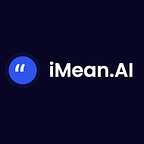The future of AI is Agent?
We’ve got the inside scoop on the future of AI.
All of our smartest startup friends are trying to build autonomous agents. Now Amazon is joining this game. A few days ago, they announced that agents would be integrated inside Bedrock, their service that lets businesses access AI models like Claude and SDXL. The goal is to give businesses agents that can answer questions about their data and execute tasks.
What does an AI agent even mean?
Well, everyone knows that ChatGPT can handle a single task, like “code a website.” But then you need a human to take action with the code. Autonomous agents, on the other hand, multitask all at once: code a website → publish it → debug it → add code….and voila!
AI agents are designed to think and act independently. The only thing you have to provide is a goal — be that scheduling a meeting or finding the top 3 toys on Amazon. They’ll generate a task list and get to work, relying on feedback from the environment and their own internal monologue. It’s as if the AI agents can prompt themselves, constantly evolving and adapting to achieve their objective in the best way possible. You can imagine it is a personal AI assistant like Tony Stark’s Jarvis. Super cool, right?
Characteristics of an AI agent
AI agents are software programs designed to automate tasks. There are several specific key characteristics that differentiate AI agents as more sophisticated AI software.
- Autonomy: An AI agent is capable of performing tasks independently without requiring constant human intervention or input.
- Perception: The agent function senses and interprets the environment and context they operate in.
- Reactivity: An AI agent can assess the environment and respond accordingly to achieve its goals.
- Reasoning and decision-making: AI agents are intelligent tools that can analyze data and make decisions to achieve goals. They use reasoning techniques and algorithms to process information and take appropriate actions.
- Learning: They can learn and enhance their performance through machine, deep, and reinforcement learning elements and techniques.
- Communication: AI agents can communicate with other agents or humans using different methods, like understanding and responding to natural language, recognizing speech, and exchanging messages through text.
- Goal-oriented: They are designed to achieve specific goals, which can be pre-defined or learned through interactions with the environment.
Why do AI agents matter?
iMean AI is an AI agent, and we believe this marks one more step toward AGI (artificial general intelligence). We’re getting closer to the moment when a machine is able to carry out the same kinds of tasks that humans can across any topic or area of specialization, with complete flexibility and superior performance.
When compared with mainstream automation — where you set up a range of triggers based on data or system states and configure what happens next — AI agents can work in unpredictable environments where there’s a lot of new information. It’s artificially intelligent automation.
AI agents can use computers extremely well, too. They can browse the web, use apps, read and write files, make payments with your credit card, and even control your laptop as they do so.
The future of autonomous AI agents is full of exciting possibilities. As organizations realize the potential for enhanced efficiency and productivity, the use of autonomous agents is expected to soar. In the next article, we will discuss the types, advantages, challenges, and applications of AI Agents. Keep tuned!
Try iMean AI now: https://chrome.google.com/webstore/detail/imean-generative-ai-meets/kjbmffebjpefbpfokhammhcnknnebhab?hl=en-GB&authuser=0
